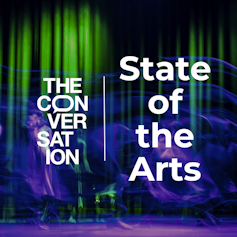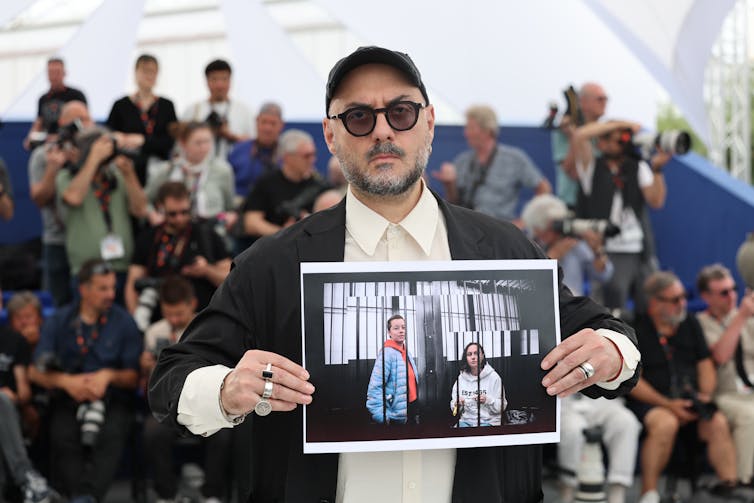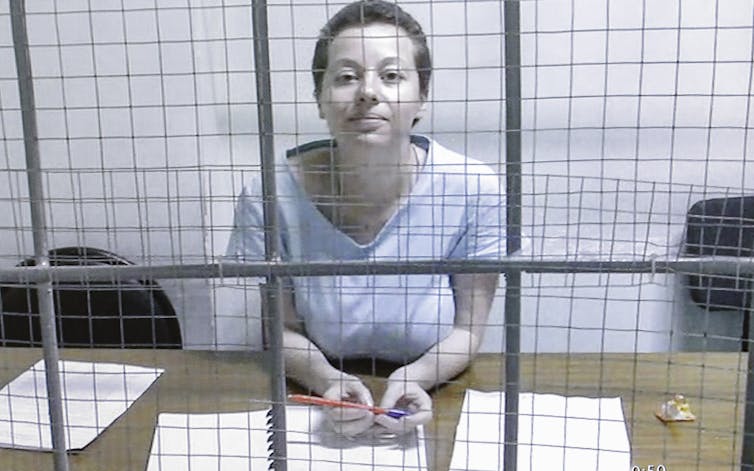The savage purging of independent thought and creativity among Russian intellectuals since Putin’s 2022 invasion of Ukraine continues apace.
In 2020 a play called Finist the Bright Falcon by Svetlana Petriychuk premiered in Moscow. The state-funded production was directed by Evgeniya Berkovich. The play won two awards at Russia’s prestigious Golden Mask theatre festival in 2022. Its title is drawn from a popular Russian folk tale. The tale describes the long and hazardous journey undertaken by a fair maiden in order to find true love with a young prince who had visited her in the guise of a bird with magnificent plumage.
Petriychuk’s play seeks to understand the naive decisions of young women who have been seduced online to go and become brides of Isis fighters, and who are charged with terrorism offences when they return to Russia. It was partly based on court transcripts.

This article is part of our State of the Arts series. These articles tackle the challenges of the arts and heritage industry – and celebrate the wins, too.
Several describe their dull lives in Russia and difficulties with Russian men. Their supposed future husbands tempt them to travel to Syria with fantastical and exotic narratives of life as a Muslim bride. None of the women express any awareness of terrorist violence. On the Golden Mask website Petriychuk explains:
We took an extremely complex theme, in which it was exceptionally difficult to connect with the protagonists, to understand them, to have empathy with them, and to understand what happened […] What does a person – a woman – lack, for her to gamble absolutely her entire life, and entrust herself not even to a man, but just to an image on a screen, and then dash off to some fairytale land in order to find her Finist?
In May 2023, two years after the play’s run had ended, the theatre world was stunned when Berkovich and Petriychuk were themselves arrested. They were charged with terrorism offences relating to Isis ideology propaganda. Petriychuk was accused of writing the play because of sympathies with Islamist extremism and director, Berkovich, was accused of conspiring with her. They could face five to seven years in prison if found guilty: the acquittal rate in Russian courts is less than 1%.
Both women were refused bail and have now been imprisoned for over a year in pre-trial detention, even though Berkovich is the mother of two adopted daughters with developmental issues. No pro-Islamic materials were found during searches of her apartment.
In spring 2024, a petition with 16,000 signatures supporting Berkovich and Petriychuk was published. Dozens of leading intellectual and cultural figures have vouched for their artistic and human credentials, but these pleas have been ignored. The pre-trial investigation has dragged on, even though the prosecution has offered only the flimsiest of evidence.

On May 20, this surreal case finally came to trial in a military court. The two defendants were brought to the hearings in handcuffs and confined to a glass cage during the proceedings. The charges were initially brought on the basis of a “destructological”, “expert analysis” of the play and its performance.
The expert, Roman Silantev, invented the “science” of destructology himself and claims it comprehensively examines extremist and terrorist organisations. Silantev argued that the play seemed to endorse Isis ideology while also promoting “an ideology of radical feminism” by depicting Russian men in a defamatory light. There are glaring contradictions in accusing the two women of simultaneously supporting radical Islam and radical feminism. But even the Ministry of Justice’s own admission that “destructology” is not an officially recognised science has not prevented these two themes from shaping the case against them.
Strikingly, most prosecution witnesses, such as the actresses from the production, have insisted that the play was intended precisely to work as a warning against Isis grooming strategies.
The trial has raised existential questions about the nature of an artistic product and the responsibility of a work’s creator for its content. As the exiled playwright Mikhail Durnenkov commented:
I can only agree with those who consider the ‘expert report’ on Finist the Bright Falcon to be one of the most ludicrous documents of our ludicrous epoch. The logic of the prosecution could easily have charged Dostoyevsky with justifying premeditated murder, Pushkin with promoting arson and robbery, or Tolstoy with instigating a war.
Berkovich has declared that she doesn’t even understand how the words of the charge can apply to her, since they are so absurd. The two women have responded with humour and great courage throughout, but by June 10, the strain on Berkovich made it necessary for her to receive emergency medical care in the courthouse.
On June 13 it was announced that all future sessions of the trial were to be held behind closed doors after the prosecution said witnesses were being threatened on social media. The defendants’ team has pointed out that there is scant evidence for any threats, and noted how “convenient” this step was, since it coincided with the start of evidence from the witnesses for the defence.

This case is the most shocking recent example of Putin’s purge of contemporary culture. It is the first time a playwright and director have been put on trial for a play in Russia. Doubts about the content of a play exploring the subject of radicalisation in the west are not unheard of. In 2015, the UK’s National Youth Theatre cancelled production of a play about youth radicalisation by Omar El-Khairy, just ten days before its first performance. This led to accusations of censorship. But at least El-Khairy and the director were not put on trial for their artistic work.
Why is this egregiously cruel injustice happening? Some have suggested that Berkovich’s anti-war poems may have attracted hostile attention to her. Why otherwise initiate this case in 2023 in relation to a play from 2020?
The exiled theatre and film director Kirill Serebrennikov has said of Berkovich (his “favourite pupil”) that: “We should be proud of you: in the culture of any normal country people like you would represent a rarity, a miracle, a source of pride. But in Russia at the moment everything is topsy-turvy.”
Thousands of people apprehensively await the verdict. For the moment it seems that theatre will only be allowed to survive as an instrument of patriotic discourse in Putin’s new Russia.

